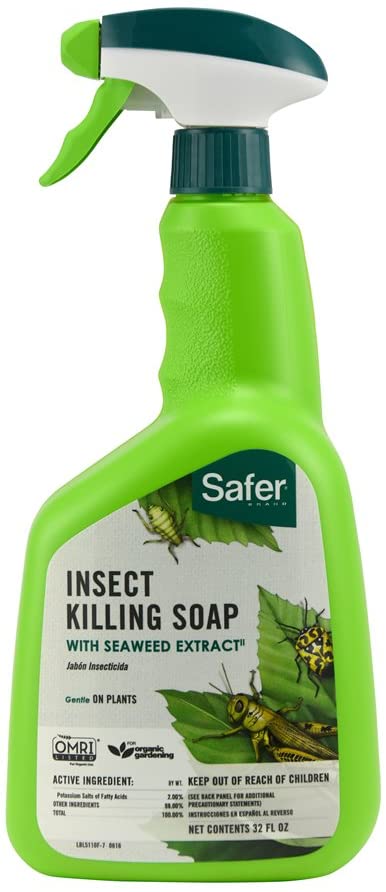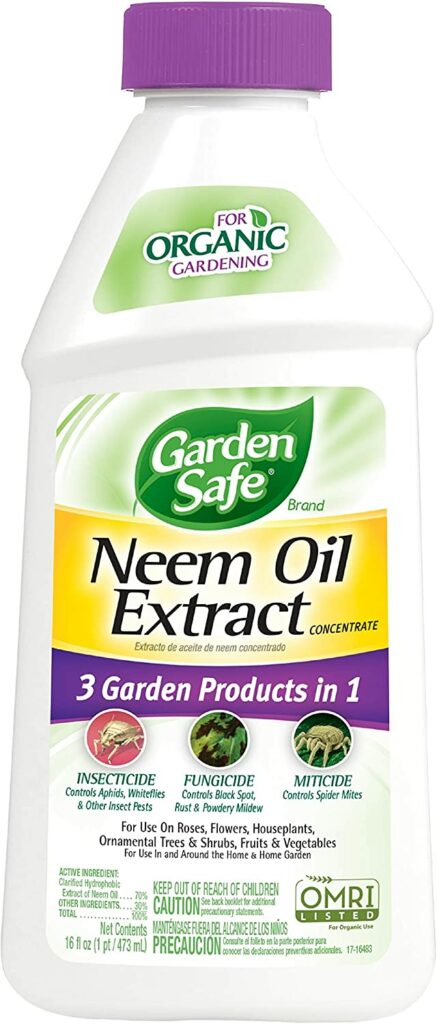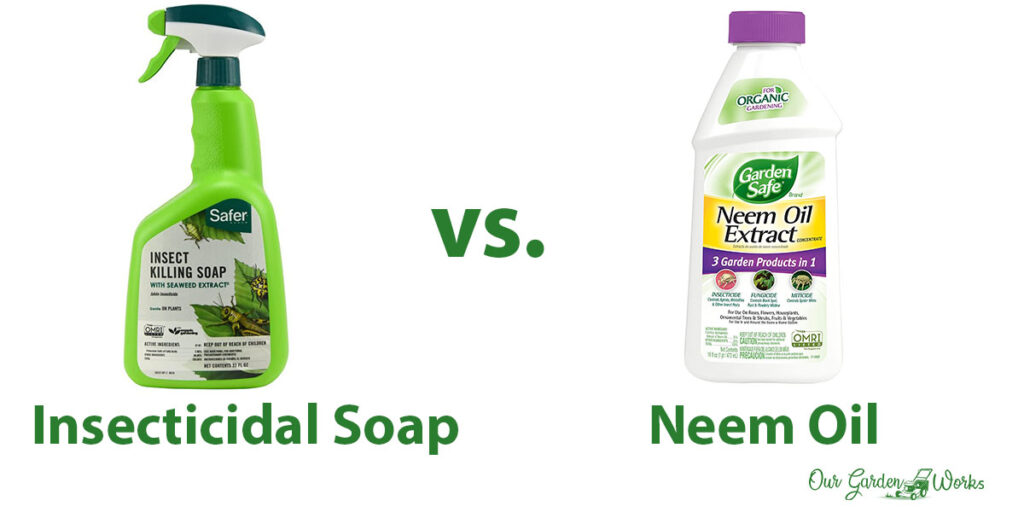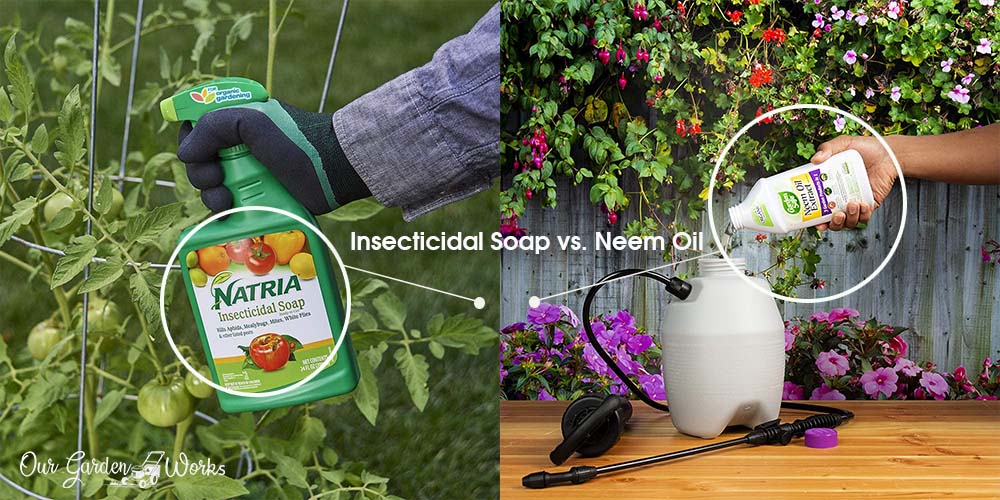Who would’ve thought that it would be hard to choose between organic insecticides?
Insecticidal soap and neem oil are among the leading organic insecticides in the market that have sparked several debates and studies about their pest control prowess.
Both insecticidal soap and neem oil are widely used due to their ability to control pests without causing too much damage to plants. They are also safer than chemical and systemic insecticides along with Bt or Bacillus Thuringiensis.
However, their differences lie in their composition and pest control capacity. Nevertheless, they are contact insecticides wherein insects are killed when they get into contact with the diluted pest spray.
If you want to discover which is better between insecticidal soap and neem oil. Learn more about how they control pests and what sets them apart from each other.
(You could use the table of contents below to jump to the sections that are most important to you.)
How Does an Insecticidal Soap Control Pests?

Insecticidal soap is a contact insecticide that controls soft-bodied insects through suffocation. It damages the protective coat of insects and causes them to dehydrate. Its active ingredient is potassium salts of fatty acids.
The fatty acids are responsible for dehydrating insects by breaking down the permeability of their coats and makes them brittle.
Once they move, their coats will break and cause the cells to leak out until they become dehydrated and die.
It is non-toxic to humans, animals, and to beneficial insects which are the main concerns in synthetic insecticides.
Insecticidal soap is also environment-friendly and doesn’t leak to groundwater and contributes to water pollution.
It is a versatile insecticide since you can make your insecticidal soap or buy a ready-to-use formula online.
The leading insecticidal soaps in the market are:
- Miracle-Gro Nature’s Care Insecticidal Soap RTU (Ready-to-Use)
- Safer Brand Insect Killing Soap
- Natria Insecticidal Soap Organic Miticide (Ready-to-Use)
- Bonide Ready-to-Use Insect Soap
On the other hand, if you want to save a few bucks from buying insecticides, you can make one at home.
Here’s how to make a homemade insecticidal soap:
How To Make a DIY Insecticidal Soap?
Materials:
- 1 cup of oil
- 10 tbsps. of dish soap with no added formula like bleach or moisturizer
- 5 cups of water
- Spray bottle
Directions:
- Mix 1 cup of oil and dish soap in a container.
- Dilute the mixture in 5 cups of water.
- Transfer the solution to a spray bottle.
The mixing ratio is 2:1 for dish soap and water, respectively. Adjust the concentration based on the amount that you need for the day.
Application Reminders:
Insecticidal soap can cause more damage to plants if they are:
- Showing signs of water stress due to overwatering or underwatering.
- Applied in temperature higher than 90 degrees Fahrenheit
- Too much humidity prevents the solution from drying
Since it is a contact insecticide, one application may not be enough to control all pests. Apply it daily until you see better results.
How Does Neem Oil Control Pests?

Neem oil is a botanical insecticide derived from toxins extracted from the seeds of a neem tree. It is a multipurpose solution as it serves as an insecticide, fungicide, and miticide. As an insecticide, it has azadirachtin which is responsible for preventing insects from growing by disrupting metamorphosis.
Neem oil controls insects by interfering with their ability to eat, grow and lay eggs. Therefore, preventing the insects from multiplying and starving them until they die. It is also an effective treatment for nematodes and powdery mildew in plants.
It has low toxicity and is safe to use on fruits and vegetables since its insecticidal properties do not harm humans when ingested. It’s a perfect preventive solution to protect your plants from pests and disease from spring till fall.
Neem oil has been used by gardeners even during ancient times and remains a popular pest control across the world. It is even the initial solution for pest infestation that can’t be identified by gardeners. Since it has three roles in plant care, you can never go wrong in applying it to an unidentified pest infestation.
The leading neem oil products in the market are:
- Garden Safe Neem Oil Extract
- Bonide Ready-to-Use Neem Oil
- Organic Neem Bliss Pure Cold Pressed Neem Seed Oil
- Safer Brand Neem Oil Concentrate
- Natria Neem Oil Spray for Plants Pest Organic Disease Control
- Dyna-Gro Neem Oil
Though it is an organic insecticide, neem oil needs a different approach since it is oil-based. It can:
- Burn plants if applied when the sun is up.
- Cause skin and eye irritation in some brands
- Cause lung irritation when inhaled
It is recommended to use safety equipment when handling neem oil. Keep pets and kids away from the plant area until the leaves are dry.
After that, you can go to your normal routine without worrying about its toxicity.
Neem oil doesn’t kill beneficial insects like bees and doesn’t leak into the groundwater and waterways. It kills insects on contact so you have to make sure to apply it frequently until the signs of infestations are gone.
You may also want to wipe every leaf with the neem oil solution to get rid of the microscopic eggs of pests on the leaves.
You might like: What Are The Best Insecticides For Roses? – Reviews & Top Picks
The Differences: Insecticidal soap vs. Neem oil

While it is easy to use any of these two insecticides, there are remarkable differences that make one insecticide favored by gardeners over the other.
The best insecticide for every gardener depends on tier preferences and gardening style.
In this section, we will discuss the factors you need to consider in choosing between insecticidal soap and neem oil.
1. Composition
Neem oil is an oil-based insecticide that may contribute to plant injury when applied to drought-stressed plants.
The oil will rapidly decrease the plant’s ability to absorb and release moisture through the leaves and may cause more harm than good.
It is also crucial to not use neem oil with products that contain sulfur. The combination of neem oil and sulfur is highly toxic to plants. Allow a 30-day interval before you apply sulfur to plants treated with neem oil.
Since neem oil has a thicker consistency, you may need a spray that spreads a fine mist. This is to prevent large droplets from forming and burning the leaves due to increased concentration of neem oil.
Meanwhile, an insecticidal soap may only cause harm to plants that are sensitive to it. This is what patch tests work.
Apply the solution to a small patch of leaf and observe it in 24 hours. If you see signs of wilt, do not use insecticidal soap on that plant.
The plants that are slightly sensitive to insecticidal soap are:
- Lantana
- Maidenhair fern
- Nasturtium
- Plum
- Purslane
- Tomato
- Cherry
- Newly grown Conifers
- Crown of thorns
- Easter lily
- Gardenia
- Hawthorn
2. Control Process
Both neem oil and insecticidal soap control can control the common pests in plants. They are most effective on soft-bodied insects, larvae, and their eggs.
These insects include:
- Aphids
- Mealybugs
- Thrips
- Whiteflies
- Mites
- Scales
- Leafminers
What puts neem oil on a vantage point is it can also control mites and fungal diseases which is not the case for insecticidal soap. It is one of the most effective treatments for powdery mildew.
It prevents and controls the following diseases:
- Leaf spot
- Black spot
- Rust
- Scab
- Anthracnose
- Tip blight
It can also control bacterial diseases in plants and should be applied to plants when they are dormant during winter.
3. Toxicity
Insecticidal soap is not in any way toxic to humans and animals. It’s a higher concentration of soap and can be washed off anytime. However, just like other soaps, it is harmful when ingested so keep it out of reach of children.
Neem oil, on the other hand, has low toxicity and is safe to use around kids and pets as long as it dries up.
In some cases, it may cause skin irritation and can irritate the lungs when inhaled. You still need to use safety equipment in handling neem oil.
4. Burning Risks
Due to the nature of neem oil, your plants are susceptible to burning due to improper application. They should be applied early in the morning or at night.
You should also avoid using other plant care materials like sulfur. With proper application and knowledge of the burn risks, using neem oil can still be manageable.
Insecticidal soap has less risk of burning your plants unless you apply it on plants that are sensitive to it.
Like other insecticides, it may also burn if applied under the afternoon sun. Other than that, insecticidal soap doesn’t pose risks of burning plants unless you forget to dilute it in water.
Overall, the best insecticide depends on your preferences. If you want an insecticide, fungicide, and miticide in one solution, neem oil will be best for you. That is if you are willing to accept the risks associated with using neem oil.
However, if you want to err on the side of caution, insecticidal soap would be your best bet. You also have the option of creating your insecticidal soap or buying a ready-to-use solution.
If you want to use the safest method, opt to buy an insecticidal soap since most brands available online are already tested on plants and safer to use.
Frequently Asked Questions (FAQs)
Is Neem oil the same as insecticidal soap?
Neem oil and insecticidal soap are the same in areas such as controlling soft-bodied insects and they are both contact insecticides.
That means, they can only kill the insects and their larvae or eggs if they get into contact with the solution.
Can you mix neem oil with insecticidal soap?
Neem oil can be mixed with insecticidal soap to help improve the pest-killing strength of neem oil. Here’s how:
Materials:
- 5 ml Neem oil
- 2 ml Dish soap
- 1 liter of water
- Spray bottle
Directions:
- Mix the dish soap into the water.
- Slowly add in neem oil
- Mix it well and transfer it into a spray bottle.
Pro Tip: Perform a patch test on a leaf first. This is to see if the plant can tolerate the strength of the neem oil and insecticidal solution.
Does rain wash off neem oil?
Yes, rain can decrease the efficiency of neem oil. You need to re-apply it whenever it rains or when the infestation persists.
Neem oil doesn’t have a lasting residual effect, unlike other insecticides that’s why it is safe for beneficial insects.
Can you spray neem oil every day?
No. The recommended application of neem oil is once a week for infestations and 3 weeks for prevention.
It would overwhelm your plants and even do more harm than good. Unless it rains a lot in your area, you don’t need to reapply daily.
Can I spray neem oil on soil?
Yes. neem oil works as a foliar spray and soil drench. It can become a systemic insecticide wherein it is absorbed by the plant roots and distributed to the entire plant system.
So, whenever a pest tries to feed on the leaves, they will die from toxins of neem oil in their digestive system.
Can I eat vegetables sprayed with neem oil?
Yes. Neem oil is among the insecticides that you can use until the day of harvest.
The toxins of neem oil are only effective on soft-bodied insects and are not toxic when ingested by humans. It is the reason why it is one of the most preferred insecticides of organic gardeners.
Can you spray too much neem oil?
Yes. Spraying too much neem oil can burn your plants. The leaves will be smothered with neem oil which can burn due to high concentrations of the solution.
The ideal application is every week for infestation and 3 weeks for preventive measures.
Final Thoughts
In terms of function, neem oil is at a great advantage since it is an all-in-one solution to common pest problems in plants.
However, insecticidal soap is also an effective, safer, and affordable solution when it comes to controlling stubborn pests. The choice is yours since the plant’s needs will be the basis for the solution you are looking for.
We hope that this post helped you weigh the pros and cons of neem oil and insecticidal soap.
Share this post with your friends so they can also decide which insecticide to buy for their plants. If you choose either of the two, let us know your experience in the comments below.

In the section: “How To Make DIY Insecticidal Soap” It lists 1 cup of oil. Motor oil, Castor oil, Sunflower oil ?? Which OIL are you referring to ????
Hi David, you could use any oils made from vegetables, peanut, corn, soybean, castor, etc.
Without getting the MSDS for each brand of dish soap the idea of mixing your own is a blind shot in the dark. I also don’t care if its organic or any of the other catch words. I need it to work and be as cheap as possible. How about coming right out and saying which inexpensive dish soap will do the job. One article says use “Dawn” next one says don’t use it. This all results in a 100% vote of no confidence. If man has been using insecticidal soaps for centuries, that tells me they weren’t using a commercial product approved by the EPA.